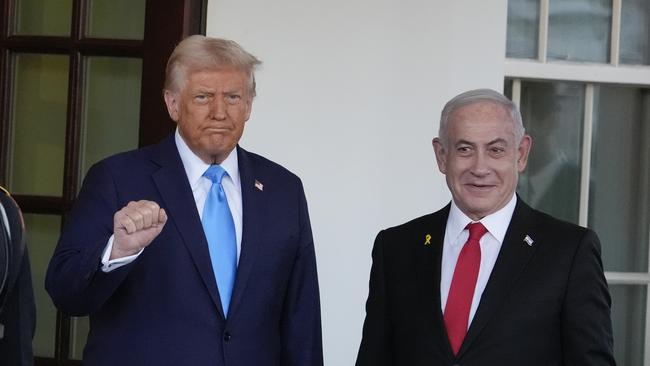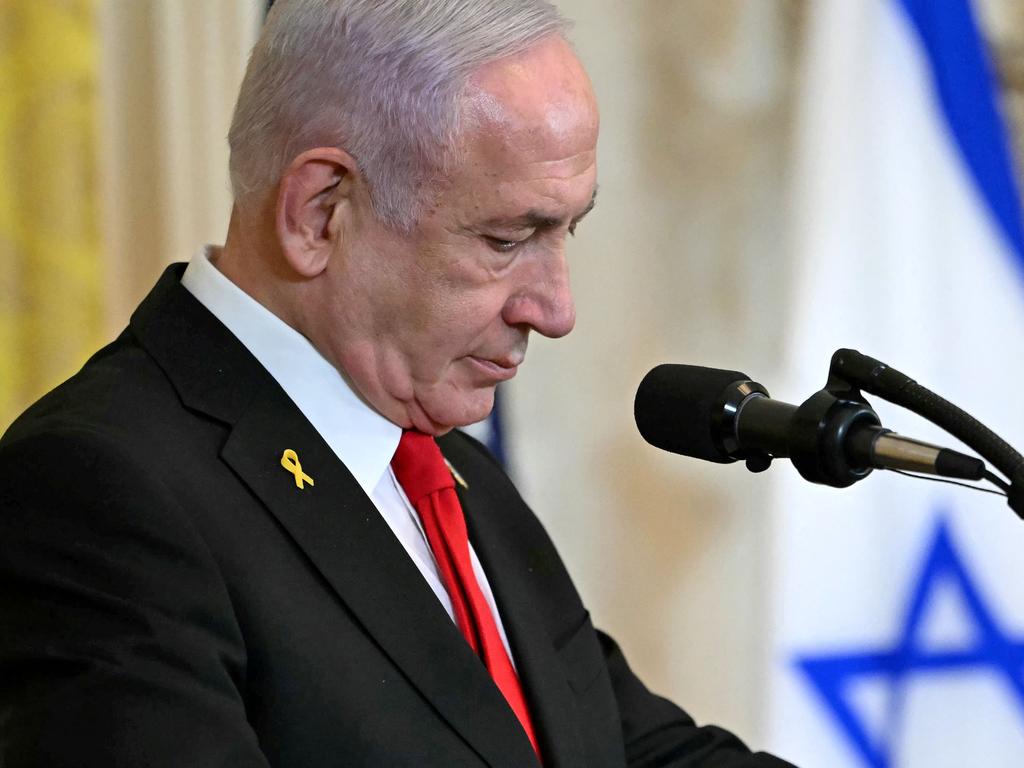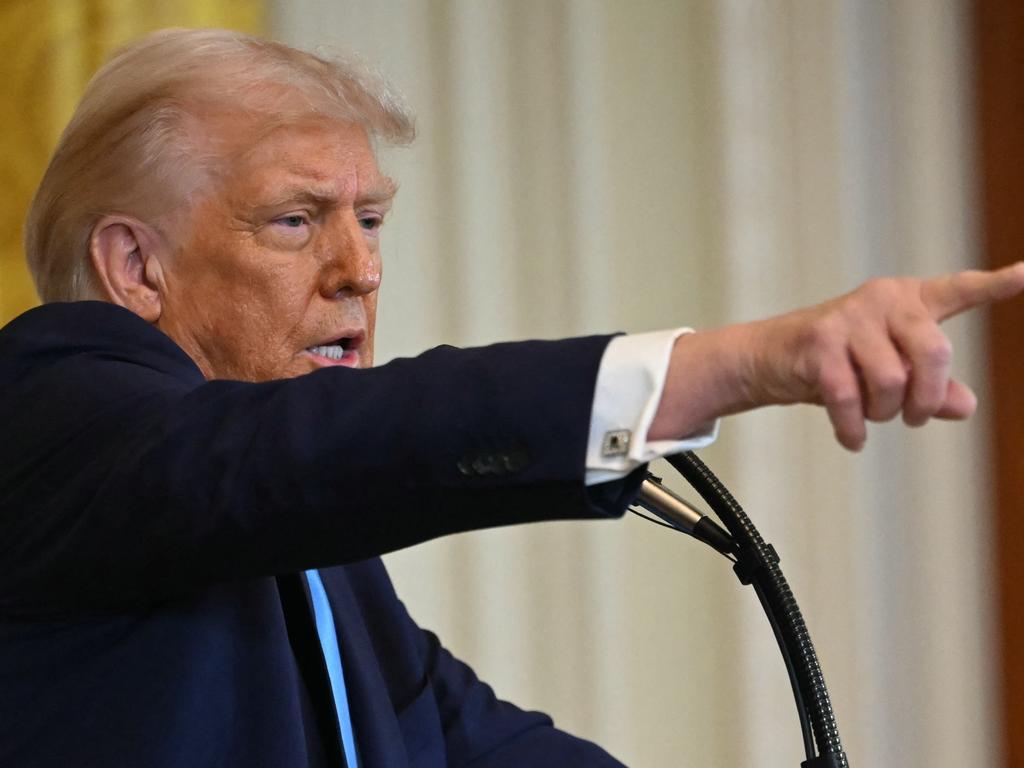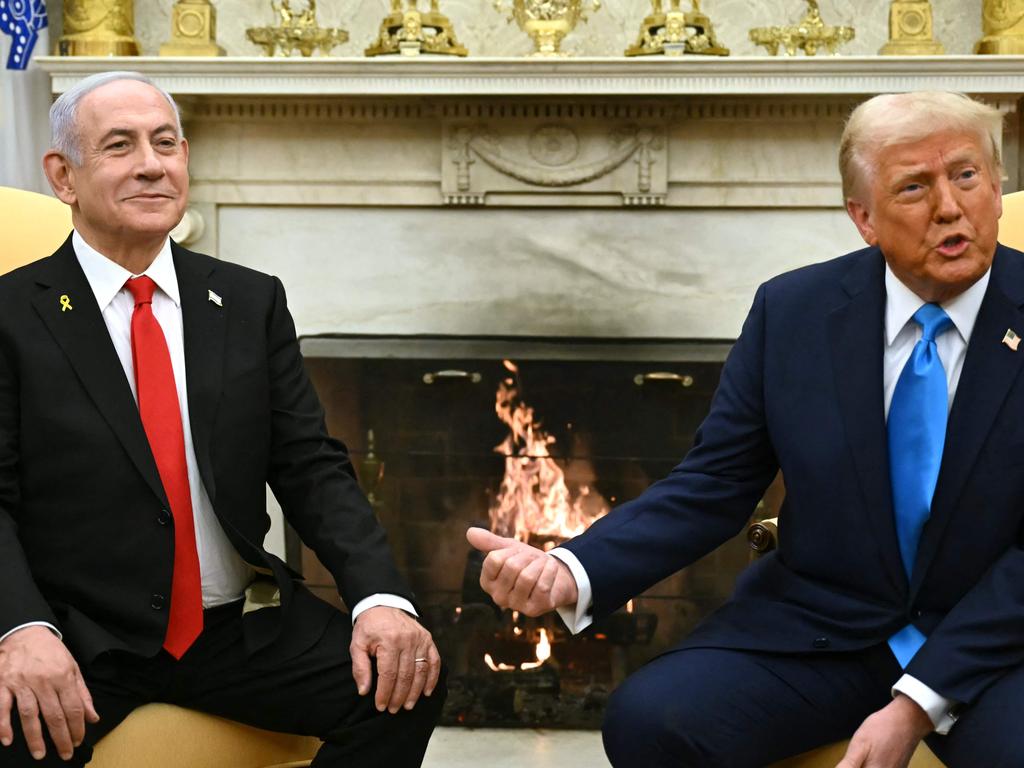Donald Trump’s clever Gaza play may even help Middle East peace
The US President’s radical ‘Riviera’ idea may be just what’s needed to break the impasse.
So that’s all crazy, right?
’Cos we all know that’s not going to happen.
But take even a step and a half back and it may well be that Trump has actually achieved something constructive in this press conference. In his first term, Trump edged the Middle East towards peace more effectively than any president in decades, certainly more than the nearly senescent Joe Biden, or the endlessly moralising but strategically feckless Barack Obama.
To reach that conclusion doesn’t require for a second joining up to the legions who think Trump never makes a mistake, that everything he does is four-dimensional chess while the rest of us are playing noughts and crosses.
But nor is Trump remotely an idiot. You don’t win the US presidency twice if you’re an idiot. Trump does some things brilliantly, some things unbelievably badly. The germ of wisdom is to be neither pro-Trump nor anti-Trump, but to try to evaluate his actions and outcomes as they actually work out in the real world.
In his first term, Trump was stunningly successful in the Middle East, producing, in the Abraham Accords, four normalisation and peace agreements between Israel and its neighbours, the United Arab Emirates, Bahrain, Morocco and Sudan.
Don’t think these agreements didn’t involve the most complex American diplomacy. They would have earned any other president a Nobel peace prize. The most important was the agreement with the UAE. Reportedly, part of the UAE’s motivation was that Trump was considering approving Israel formally annexing the West Bank, or a big chunk of it. The Emiratis reportedly got from Trump a promise he wouldn’t do this. That allowed them to sell the deal domestically as protecting the long-term interests of the Palestinians.
Did Trump really plan to green-light annexation? Did the UAE really bargain him out of it? Did Trump or the UAE believe this? Who knows? But Trump introduced a new factor into the equation, a new bargaining chip, and then cashed it in for an extremely good outcome. Maybe some other president could have got it, but only Trump did get it. Biden got nothing in his four-year presidency.

Back to Gaza and Trump’s historic press conference. Trump spoke with genuine compassion for the people of Gaza: “The Gaza Strip, which has been a symbol of death and destruction for so many decades and so bad for the people anywhere near it, and especially those who live there and frankly who’ve been really unlucky. It’s been very unlucky. It’s been an unlucky place for a long time.”
Trump offered Gazans an alternative vision. Its people could go and live for a time in subsidised housing somewhere else while Gaza itself was transformed into a beachside development of coastal resorts, condominiums and the rest.
It’s all wildly unrealistic, of course, and will never happen. But let’s stick with Trump for a minute. He also offered American resources to clean the territory up, getting rid of some 30,000 unexploded bits of ordnance. He said America could “own it”. We have no idea what he meant by this; presumably own the condominiums rather than the territory, although at the same time he rather confusingly said the construction work would be financed by neighbouring nations.
He didn’t suggest sending US troops, but he didn’t rule it out. Naturally, the media performed its normal task of shrieking hysterically when the most preposterous policy options are not comprehensively ruled out.
Trump never suggested forced relocation of the Palestinian population. But naturally many assumed the worst. Learned articles proliferated about the difficulties American troops would face in Gaza.
Next day, the White House was clearing everything up. Trump’s press secretary, Karoline Leavitt, briefed explicitly that the US wouldn’t put any troops on the ground, wouldn’t pay for the reconstruction of Gaza, and if any Palestinian refugees were temporarily housed somewhere else it would be in regional nations.
Secretary of State Marco Rubio and Defence Secretary Pete Hegseth made similar, definitive clarifications.
OK, so let’s all indulge in a round of calling Trump names.
Feel better?
Now let’s examine what Trump might actually have achieved in the press conference.
Dave Sharma, Australia’s former ambassador to Israel, knows the dynamics of Middle East politics as well as any Australian. He tells Inquirer he believes the Israel-Hamas ceasefire is now more likely to proceed than it was before the press conference.
Trump offered Gazans, and their ostensible leaders, a different future. Says Sharma: “In his own way, the President was saying: it doesn’t have to be like this.”
Trump was also calling on Arab national leaders – Saudis, Egyptians, Jordanians, the Gulf Arabs generally – to do more for the Palestinians, and with the Palestinians. He assuredly wasn’t calling on them to run a campaign demonising Israel or asking Israel to tolerate regular terrorist atrocities like those on October 7, 2023.
Trump was asking them to do something about the development of Gaza, and implicitly, because it can’t be achieved otherwise, something to tame Hamas politically. And reminding them of potential outcomes they mightn’t like.
Sharma again: “I think that’s what Trump is trying to do. He’s trying to scare them all (Arab leaders) with the possible alternative, and get them to take some responsibility.”
Maybe Trump just riffed without discipline, maybe it was all planned, maybe it was a bit of both, with Trump’s instinct for power leading him to produce certain effects. Maybe the Arabs can’t achieve anything even if they try. Let’s see.
Trump has standing with most of the Arab world because of his dedicated approach to containing Iran. Most Arab leaders understand Iran is an infinitely bigger threat to them than Israel could ever be. Biden distanced Washington from the Gulf Arabs and made endless, worthless, indeed counter-productive overtures to Iran’s rulers. These overtures did nothing but chew up US credibility and empower Iran’s government.
Trump was doing many things simultaneously in that press conference. He was both empowering, but also subtly limiting, Israel’s Prime Minister, Benjamin Netanyahu. Trump has always approached the Middle East by ignoring, even reversing, conventional wisdom. That’s smart, because conventional wisdom on the Middle East has been a dismal, wretched failure for decades.
The former secretary of state John Kerry, and virtually all Democrats, certainly including Biden’s administration, held as a point of infallible, fixed doctrine the idea that no wider Middle East peace could be achieved until the Palestinian problem was resolved. Trump thinks that’s absurd. He demonstrated its absurdity with the Abraham Accords.
Trump reverses another conventional attitude. US presidents, even those supportive of Israel as, in fairness, Biden generally was, think that to get what they regard as progress they need to put public pressure on any Israeli PM. That’s particularly so with Netanyahu because Democrats detest him politically.
Trump operates on the reverse principle. He thinks the tightest partnership with his Israeli counterpart produces the best results. He provides Netanyahu with absolute reassurance. As a result, Trump has great credibility and influence within Israel, infinitely more than Biden ever had.
Just canvassing the idea that Palestinians might move out of Gaza means Trump has won the love of the Israeli Right, even though this outcome is vanishingly unlikely.
It’s not only the Israeli Right that appreciates Trump. There’s a worldwide crisis of anti-Semitism, and a wild international campaign of demonising Israel. In this climate, as Netanyahu says, Trump is the best friend Israel has ever had in the White House. Trump is much more popular in Israel than Netanyahu is. Netanyahu has to take this into account all the time.
If Trump wants the Israelis to do something, that’s vastly more consequential than Biden wanting it. Thus, although it’s quite complicated, there’s a ceasefire under Trump; there was no ceasefire under Biden.
None of this guarantees, or even suggests, success for US policy in the months ahead. Success in the Middle East is almost an oxymoron. But it adds up to a better chance of success than at any recent time, except during Trump’s first term.
Of course, there’s a diplomatic, and probably strategic, cost in Trump’s methods. Unpredictability, ambit claims, flexibility in positions, quite radical changes quite quickly can all be powerful tools in a negotiation. They can also be deeply disturbing, even destabilising, to alliances. Though surely the world is getting to know Trump better now.
A lot of other huge stuff also went down at that press conference. Trump announced maximum sanctions against Iran. He resumed delivery of maximum effect weapons to Israel. He said in simple words no one could misunderstand: he will not let Iran get a nuclear weapon. If it looks like Iran is about to get a nuke, Trump may strike Iran’s nuclear facilities, though he didn’t say that directly, or he may support an Israeli strike. This is much more plausible now, since Israel demolished so much of Iran’s air defences.
Trump also withdrew the US from the UN Human Rights Council, and said he wouldn’t give any more money to the UN Relief and Works Agency. UNRWA delivers aid to Gaza, which is vital work, but is thoroughly politicised and ideologically destructive, with numbers of its employees co-operating hand in glove with Hamas. It also perpetuates the grotesque and ridiculous fiction that every descendant or part descendant of any Arab who ever lived even for a moment in Israel is now, today, a refugee. Thus, if an Arab left Israel in 1947, nearly a century ago, moved to Jordan and became a citizen there, married a Jordanian woman and had a child, and that child married a Jordanian spouse and had another child, and that child married another Jordanian and they had a child, all of them would be Jordanian citizens of course. The latest child might grow up to be a millionaire businessman or a cabinet minister in the Jordanian government, but the UN, fixated on its hatred of Israel, and UNRWA, devoted to the savage idea that Israel must not exist, bizarrely classifies that Jordanian cabinet minister as a refugee, to whom Israel is meant to owe some kind of reparation.
No such consideration, it goes without saying, was ever afforded to the hundreds of thousands of Jews chased out of Arab and North African nations in the late 1940s, still less to their distant descendants generations later.
The UN Human Rights Council is an infamous body, often dominated by gross dictatorships, which typically pays more hostile attention to Israel than towards all the other human rights issues of the whole world – China, North Korea, Russia etc.
Western conventional wisdom, and it’s certainly the conventional wisdom of our own Department of Foreign Affairs and Trade, is that it’s best for Western democracies to participate in and fund these organisations and attempt to moderate them. Trump’s much more realistic view is that this is absolute baloney. Under his administration, organisations which hate Israel, and which typically hate America, and which objectively serve the strategic interests of Washington’s enemies, are not going to get the credibility that comes from US membership. And they’re not going to get a dollar of American money.
This leads to a broader, profound, conclusion about Trump. He’s revealing the exhaustion of the international liberal rules-based order. He has not himself destroyed the liberal international rules-based order. He has instead revealed how hollow and ineffective it is.
Its institutions have been corrupted or simply lost their way. Its assumptions have been twisted by the non-democratic majorities in so many UN bodies. Its Western avatars are themselves often motivated by an exaggerated critique, if not hatred, of Western societies, especially the US.
A country like Australia will naturally and sensibly be much more cautious than the US, but we should mostly follow its lead on this. The rules-based order was only ever a polite way of saying: American power. After World War II, America so dominated the world, economically, politically, strategically, culturally, that it could set up a raft of institutions genuinely based on liberal values, and they, backed by the US, could help run the international system.
The US, though still by far the most powerful nation, can no longer do all this on its own. It makes more sense for it, and every sensible nation, to pursue their national interests within their ethical frameworks.
The rules-based system didn’t deter Russia from invading Ukraine, nor China from seizing and militarising the islands of the South China Sea, nor all those nations which pretend to abide by trade rules but actually construct unbreachable non-tariff barriers to their markets.
Trump simply won’t go along with any pious cant from the rules-based order era. Sharma argues that the arrival of the second Trump administration brings to a definitive end the post-Cold War period and the reign of international liberalism through institutions. He thinks nations like Australia should adapt: “We should take a much more a la carte approach. We should not belong to institutions that don’t reflect our values or serve our interests.”
Sharma thinks a smart nation will invest in alliances, all kinds of special arrangements and also those continuing international institutions that actually still work.
Even though Trump brings new energy and dynamism to the table, the immediate future in Gaza still looks very bleak. The obscene parading and harassment of Israeli hostages, as they’re being released by masked Hamas gunmen, illustrate that if the Israelis leave the territory altogether, Hamas will probably re-establish dominance. The Israelis won’t accept that.
The two-state solution remains inconceivable today, yet necessary in the long run. The Albanese government has destroyed Australia’s bipartisan position, which was to support a two-state solution negotiated by the parties. Albanese and Foreign Minister Penny Wong take the radical and frankly ridiculous view that two states can be imposed by the international community, regardless of negotiations. Technically speaking, that’s nuts. A two-state solution will need a long period of normalisation first, which must include the Palestinians moving on from terrorist death cults like Hamas.
In the meantime, the best that can be hoped for is to manage things with as little death and violence as possible. The near-term future is incredibly messy, full of uncertainty. Trump’s interventions, for all their apparent disorder, attempt to nudge things in a better direction.







Donald Trump has done it again: turned the world upside down in a single press conference, floating the idea that the United States could take “ownership” of the flattened, bombed-out and forever tragic Gaza Strip, while its population relocates to beautiful housing somewhere else, and the US supervises the transformation of Gaza into a combination of Florida and Hawaii, high-rise, hi-tech, beautiful beaches.